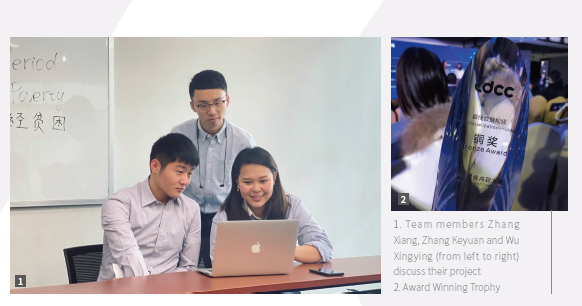Editor's note:
In the China Data Content Competition of 2020, " Data Visualization in Convergence: Scientific Storytelling and Open Data." "Period Poverty," the work of three PHBS financial media students (Wu Xingying, Zhang Keyuan, and Zhang Xiang), stood out from 60 submissions to win third place in the video category. This is the second year that Financial Media students have won awards in the Data Content Competition.
During the summer vacation of 2020, I saw the theme of “Period Poverty” on Facebook. Period poverty refers to the lack of access to sanitary products, menstrual hygiene education, toilets, hand washing facilities, and, or, waste management. Words cannot describe how I feel about this issue. Period poverty has been of great concern abroad for many years. However, it has not been taken seriously in China.
Spark of Inspiration
By chance, I saw that my tutor, Ye Weiming released the link of the China Data Content Competition in the WeChat group. At the same time, a neat little idea popped into my head. I wanted to take part in the competition because it might be a good way to deliver the message to the public. Therefore, I decided to organize a team. I found three members: Zhang Xiang, Zhang Keyuan, and Ma Xiaochun. Zhang Keyuan and I were responsible for writing scripts, Ma Xiaochun took charge of collecting data, and Zhang Xiang edited films. All the team members had the expertise and carried out their roles.
It was very difficult to collect data because many countries did not have relevant statistics, for example, the proportion of women dropping out of school. However, our work really needed these data for further analysis. Finding another way, we identified relevant research conducted by NGOs. This reflected that many NGOs were concerned about the issue of menstrual poverty and occupied an important role in promoting recognition and understanding of period poverty.

When the initial problem of data was solved, we were confronted by another big problem: we were unsure in which form our work would be presented; by web page or video? At this stage, the team could not agree on which platform to use. After referring to a lot of current works we discovered that film was most suitable because video is more likely to attract users' attention in the current social media. Moreover, a film inclined to tell a story could highlight our narrative ability and potentially promote understanding to a wider audience.
Period Poverty Matters
We discovered that period poverty was far more serious than even we had imagined. In fact, 500 million women in the world cannot access clean sanitary supplies [1]. This has two main causes: Firstly, some countries have weak economic foundations and insufficient national infrastructure. People suffer from a lack of knowledge and unenlightened sex education, and hygiene problems are especially common among women who are unable to obtain clean products during menstruations.
For example, in Nepal, there was a centuries-old social tradition called “chaupadi” which held that discharge produced during menstruation and childbirth were impure. Women were not allowed to stay at home during menstruation because their “unclean bodies” would irritate the gods. Therefore, they had to be isolated in a “menstrual hut”.
No physical contact with others or water sources was allowed. These “menstrual huts” were mostly unsanitary places such as chicken houses or cowsheds. Women could only use old clothes, leaves, or even cow dung as a substitute for sanitary napkins. This tradition has exposed many Nepalese women to long-term health risks. Even though the practice was banned by the government in 2005, and has been considered a crime since 2017, it is reported that women are still victimized to comply with the “chaupadi” tradition.
The second cause of menstrual poverty is the “menstrual tax”. In many European and American countries, sanitary napkins are classified as “luxury or non-essential goods”. The BBC calculated that the menstrual expenditure of British women (aged 14-50) was as high as 1505 pounds in their lifetime. For many women who had difficulty paying for food and clothing, the routine of menstruation was simply a financial disaster. In the UK, 1 out of every 10 females could not afford sanitary products and 12% of girls had to use rags and socks instead. Many females were forced to be absent from school due to menstruation.
Nowadays, more and more countries have tried to solve “period poverty” by invoking the law. For instance, the Scottish Parliament unanimously approved a policy ensuring that schools and offices provide free and sufficient tampons, slivers and moon cups to address the lack of health resources caused by attitudes to gender and the economy.
New Way of Telling Story
As the amount of data in the world has increased, becoming easier to access, the trend has been for data visualization and journalism to combine to provide information in new ways that help readers understand complex stories in simpler terms. Depending on data, journalists can translate words into pictures, graphs, animation, charts, maps or any type of visualization.
As a financial media student, I think the course of Data Journalism and Information Visualization is very useful and lays a good foundation for this competition. Professor Ye Weiming guided us to complete Period Poverty data news work, from the topic selection, data collection, art design, to the final presentation.
Her teaching method was both professional and interesting, and students were well versed. Furthermore, PHBS has incorporated cutting edge subjects such as data analysis and information visualization into our curriculum for the Master of Financial Media at PHBS. The school also established a media lab, equipped with an advanced video studio, to provide PHBS faculty and students a professional platform for financial news teaching, research and practice.
Consequently, its students have started to demonstrate strength in related fields. In the China Data Content Competition of 2020, a total of 7 entries from PHBS were shortlisted, with the work “Historical Slice of Cancer Village,” by Zhao Luming, Zhu Xiaomeng, and Zhao Bowen, winning first place. This was the second time that students from financial media program have won the best data journalism gold award. Through the whole process of participating in the competition, we were inspired the issue of period poverty within the society. Although we are students and our efforts may not affect large social change, we would like to inspire the people who saw our reports to pay attention to period poverty, and we hope that eventually no woman will need to worry during menstruation.
By Wu Xingying
Edited by Annie Jin















